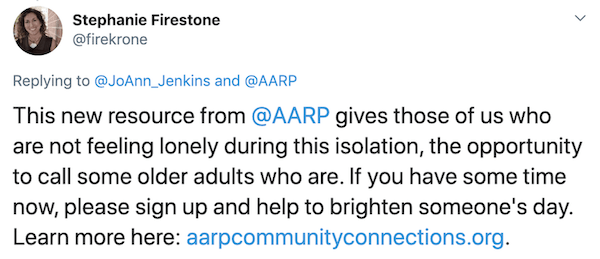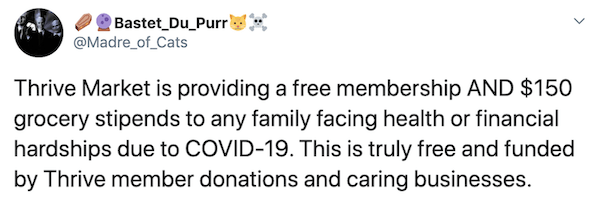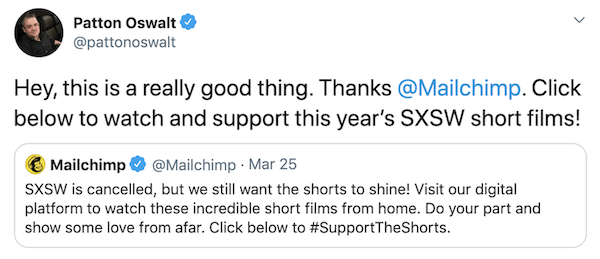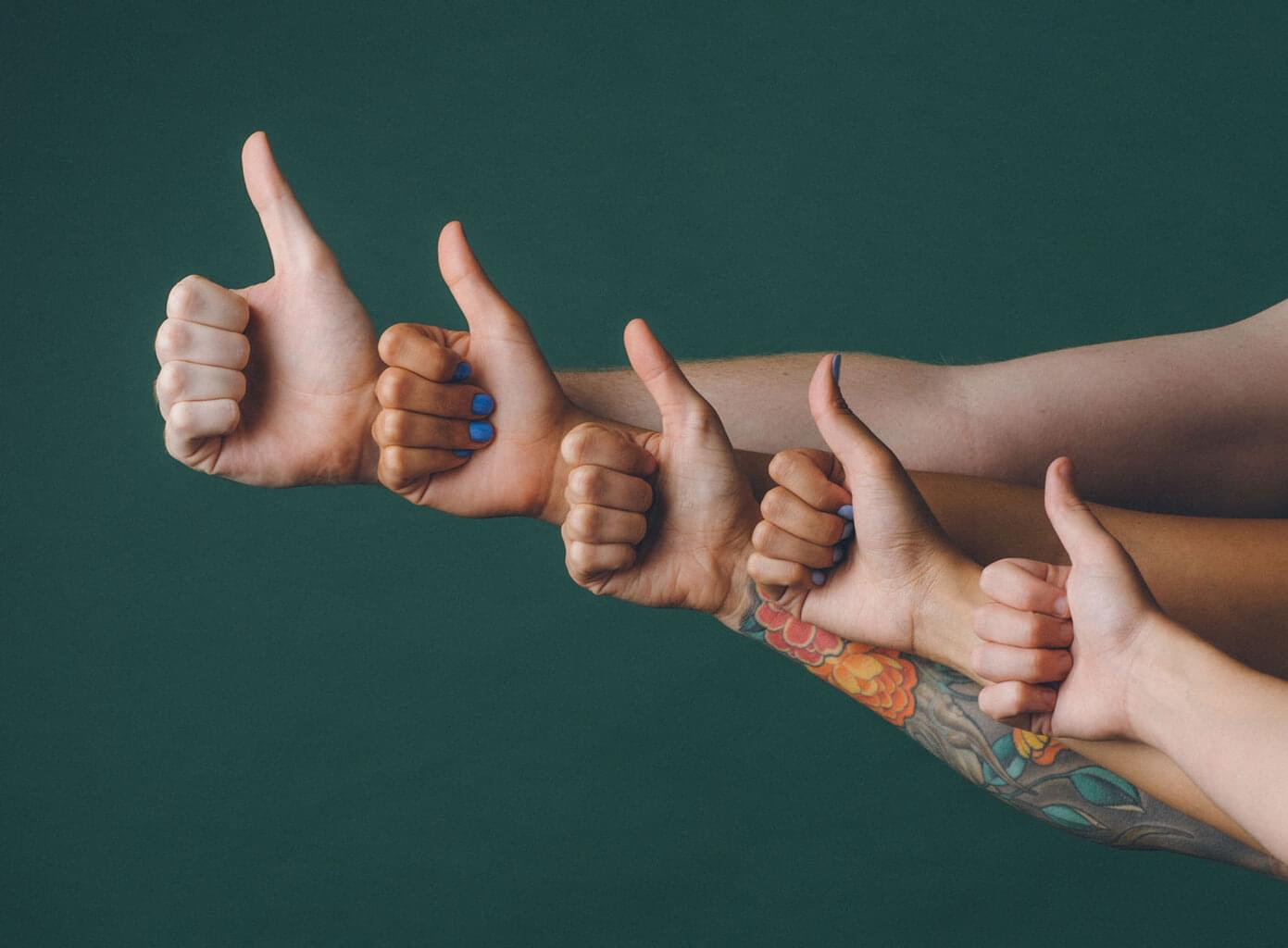Article • 9 min read
Business isn't always about commerce; it's also about community
Por Kate Crane
Última actualización en September 21, 2021
And just like that, the world was different. Enter, a fearsome illness that can only be stopped if everyone stays indoors—straight out of some sci-fi classic. To protect each other and ensure a future for all, the whole world was tasked with civic duties unthinkable even a week earlier.
In times of trouble, true colors tend to show. And, wow, what a rainbow. So many businesses are rising to meet this global challenge with generosity, thoughtfulness, and care. Many brick and mortar operations, before official orders even came down, closed their doors, opening up to dire financial risks, in order to protect staff and community alike. Businesses have gone further, asking themselves: What does it mean to be the company your customers want you to be? Accommodate customers—the basics, sure. But companies have also taken swift action to step up and do the right thing, though that might be painful.
So many businesses are rising to meet this global challenge with generosity, thoughtfulness, and care.
With admiration, we share the following examples of ingenuity and sharing—and some great resources for us all. Read on for how businesses are harnessing their unique skills and expertise in the fight against Covid-19.
Helping people connect
What’s your six-year-old got in common with your CEO? They both have a 2 p.m. call over Zoom. For the moment, playdates, classes, spiritual gatherings, and just about everything else that involves people who don’t live together in the same room is out the door. In? Video-conferencing. The already popular Zoom is now helping people of every age and tech proficiency stay connected. Understanding the social imperative of its service, Zoom is amplifying it. The free plan is unlimited for one-on-one meetings, and up to 100 people can meet for free for 40 minutes. To specifically address the current crisis, Zoom has set up a comprehensive guide that covers remote working, distance learning for teachers, digital events, telehealth, and cybersecurity.

Concerned for those who may be more isolated than others, AARP set up a site devoted to the concept of mutual aid, which they define for their readers as “picking up groceries, providing financial assistance, or lending emotional support to your neighbors.” On this page, the organization has gathered resources for coronavirus information, along with a discussion board. Those who are feeling alone can request a phone call from an AARP volunteer, and the site also offers assistance for people who are helping friends or family through tough times.

Fostering learning and wellness
We are learning how to learn and stay fit—and maybe hardest of all, stay calm—on the fly. Khan Academy is offering weekly lessons at grade-appropriate stages and tons of free resources for both teachers (like remote-learning webinars and Q&As with Khan Academy educators) and parents (a remote-learning FAQ and other guides). The Khan Academy Kids team also launched a new YouTube channel featuring a daily Circle Time.


Considering how much time we’re all spending inside, guitar manufacturer Fender’s stance is that “we might as well make some noise”—and is offering 3 months of free virtual guitar lessons through their Fender Play platform.
For something quieter, Headspace is giving free access to its Headspace Plus meditation app to US healthcare professionals who work in public health settings until the end of 2020. And Calm offers a curated resource page with free meditations, music, and stories—including a collection to help soothe children—to the general public.

Physical fitness organizations like Spartan Race have not only gotten creative—for every race it postpones, there will be a virtual version—but it’s also gone the extra mile to offer a free 90-day subscription to Spartan EDGE, its digital training platform with resources and videos that address nutritional and mental health in addition to physical fitness, available 24/7. Peloton is also offering a free 90-day trial of its workout app, which includes yoga, strength-training, and other classes—and doesn’t require anyone to own one of the company’s stationary bikes.
[Related read: How messaging fosters strong connection—and how 4 brands use it]
Safeguarding the vulnerable
Grocers, as essential businesses, were also swift to take action to protect high-risk senior citizen shoppers. Many, from iconic Rainbow Grocery in San Francisco to national chain Dollar General, moved to establish seniors-only shopping hours. The UK’s Tesco was quick to announce that it would open its doors to seniors-only on Monday, Wednesday, and Friday between 9 a.m. and 10 a.m., and is proactively giving all at-risk staff 12 weeks of paid leave.
Thrive Market, a U.S. e-commerce and membership-based grocer, is matching donations from its members dollar for dollar to benefit a COVID-19 relief fund. Thrive has also taken protective measures on behalf of its customers from another angle—by taking a public stance against surge pricing, promising it will not engage in the now common practice of hiking the cost of high-demand basics like… toilet paper. It’s also working to build its stock of essential categories that it calls “Immunity, Cleaning, and Pantry Staples.”

Others are stepping up to help by raising money and supporting local businesses. When GoFundMe, a crowd-sourced fundraising platform, saw that people could no longer go to yoga studios and cafes, it partnered with Yelp to add “Donate” buttons to business profiles on Yelp to help those affected by the pandemic. GoFundMe, the Yelp Foundation, and Intuit Quickbooks have also collectively committed to donating up to $1.5 million into a Small Business Relief Fund. On it’s own site, GoFundMe is also collecting donations for coronavirus fundraisers and affected communities, including a Covid-19 Relief Fund.
Of course, hospitals and world aid organizations are mobilized and many are on the front lines of the global pandemic response. Organizations like The Salvation Army are taking a regional response, catering to needs in specific communities—for example, opening temporary shelters for people who are homeless in The Netherlands, distributing care packages to the elderly in the Republic of Georgia, and offering pickup of food boxes once a week to families in need in South Dakota. It offers a good example of how companies can do good where they are, with what they have.
It offers a good example of how companies can do good where they are, with what they have.
Take Wantable, for example, a personal styling and clothing delivery service. The company is crowdsourcing volunteers to help make desperately needed face masks for medical professionals caring for COVID-19 patients. Wantable has turned its fulfillment center into a hub to create and distribute the handmade masks as part of its Sew Good effort. Volunteers receive instructions and a prepaid shipping label, then sew the masks and drop them in the mail once complete. It’s a way for crafters to put their skills to use for the greater good.

Organizations with the power to affect more systemic change, like the American Civil Liberties Union (ACLU), are moving to ease the burden for other vulnerable populations. Immigrants have been held in cramped detention centers for months, and those close quarters make it easier for COVID-19 to spread. The ACLU is calling on government officials and law enforcement to release immigrants from these centers to prevent a public health crisis. Despite a federal judge’s rejection of this emergency demand, the ACLU is pressing forward.
“We will continue to fight for our clients, who face tremendous danger to their health while in detention,” Eunice Cho, an ACLU lawyer, said in an interview with the Washington Times. “Public health officials are in agreement — it is not a matter of if there is a COVID-19 outbreak in immigrant detention centers, but when.”
Focus on the client, or the customer, in times of duress can be a guiding force for change and good. And often, for business, too.
[Related read: Customer loyalty is great, but what about loyalty to customers?]
Tech for good—offering relief, and support for relief efforts
For some companies, its technology products can literally be the solution that an organization desperately needs. Sheltering in place has changed how we relate—personally to our friends and neighbors—but also to the way we work as teams. This change particularly presents challenges for critical infrastructure like research and education, who usually collaborate face-to-face. This is why Slack has offered free upgrades to paid plans for research and response teams helping to solve the coronavirus crisis.
For some companies, its technology products can literally be the solution that an organization desperately needs.
“We’ve done hundreds of upgrades and consultations already and have an incredibly helpful, speedy and energized team standing by. We’re grateful to be able to help where we can,” Slack CEO Stewart Butterfield said on Twitter.
Other companies are stepping in to help community organizations with outreach. Email is one of the easiest ways to get critical information out quickly, so when Mailchimp began seeing an increase in activity from schools, nonprofits, and healthcare providers, it decided to offer free standard accounts to these groups. Mailchimp is also doing right by its employees by paying hourly workers, security, and janitorial staff throughout the time its offices are closed.
Fun fact: Thanks to Mailchimp, in partnership with Oscilloscope Laboratories, everyone can now also stream the short films that were scheduled for viewing at SXSW.

And Netflix could have rested on the laurels of ‘Netflix and chill,’ but the company has identified unique ways to contribute: making changes to viewing bandwidth, and committing its support to help the out-of-work creatives who make the shows and movies that entertain us all. The media and streaming company has created a $100 million relief fund and, for the rest of us, the ability to set up a Netflix Party through a Google Chrome browser. Kind of great, to watch a movie together—but safely apart—chat room and all.
[Related read: The Empathy Economy: Care, so your customers will too]
Share your stories
By no means is this an exhaustive list, but when businesses focus on relationships and respond to customers’ direct needs, everyone benefits. Across these examples, companies are leaning on their strengths and areas of expertise to be helpful in meaningful ways and to show what ‘being there’ for customers and our broader communities really means. What are some other examples? Share more good news, and good efforts, in the comments.
We want to help support nonprofits and community organizations impacted by COVID-19. Zendesk’s Tech for Good program will donate free software and support to help your teams manage volunteering, relief efforts, home assistance, and more. Apply here.
